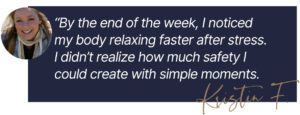Future anxiety can feel like a constant background noise, whispering that you’re never ready enough, never safe enough, never certain enough. If you’ve caught yourself spiralling in worry about what’s ahead, you already know how exhausting it is.
The good news? You don’t have to be trapped by that cycle. There are ways to meet your mind with calm, soothe your body’s stress response, and stop stressing about the future without losing yourself in worry.
Let’s dive in…
Table of Contents
Why Future Anxiety Shows Up

Racing thoughts are convincing, but not truth.
“Thought loops are convincing because they feel like preparation, but in reality, they drain energy and erode confidence.”
Future worries are the mind’s attempt to protect you by predicting what could go wrong. It thrives on “what if” thinking: What if I fail? What if I choose wrong? What if I’m not enough? These loops are convincing because they feel like preparation, but in reality, they drain energy and erode confidence.
At its core, worrying about the future is tied to survival. Your nervous system is wired to scan for danger. But when that vigilance is unchecked, it spills into every corner of life. You replay conversations, anticipate outcomes you can’t control, and try to live tomorrow before it arrives.
That’s why future anxiety can also show up as endless prediction. This is the same cycle that fuels indecision.
Future stress is not a flaw in you. It’s a protective habit that can be understood, softened, and reshaped. And the first step is awareness.
How Stress About Tomorrow Blocks the Present

Stress can cause us to feel we are staring at a map without a direction.
“Anxiety is like trying to live tomorrow before it’s even arrived.”
Anxiety is worrying about the future and robs you of today. When you’re caught in anxiety about the unknown, adventure gets postponed until “someday.”
The antidote is simpler than you think: small, grounded practices can bring you back to the only place you can actually live: this moment which slowly help you build resilience from the inside out.
This isn’t about pretending everything’s fine or dismissing real fears. It’s about shifting from control to connection. The harder you chase certainty the faster it slips away, like trying to hold water in your hands.
Acceptance becomes a quiet kind of power and a steadying anchor. I explore accepting what is, in a deeper way, illustrating how presence creates both resilience as well as trust. The more you learn to rest in what’s here, the more life starts to unfold even when the path ahead still feels a little hazy.
When Perfectionism Fuels Future Anxiety
Sometimes anxiety about tomorrow hides a perfectionism pattern: the belief that only flawless performance will keep things safe. When the mind equates mistakes with danger, the future becomes a test instead of a landscape. Learning to release that control lets calm return.
Ground Your Nervous System

Grounding your nervous system helps embrace safety and calm.
“Bit by bit, your body learns that the future doesn’t need your full-time surveillance…it needs your steady presence.”
Future worries live in the body more than the mind. Racing thoughts are only part of the story; tension in the chest, shallow breathing, or restlessness always accompany them.
The mind races ahead, yes, but the body joins in with tight shoulders, a fluttering chest, and that restless “I-should-be-doing-something” buzz. It’s your nervous system waving a little flag shouting: “Hey, danger’s coming!”
Grounding techniques signal safety to the nervous system and reduce the intensity of future worry.
-
Try a sensory anchor. Hold something textured (stone, fabric, cup of tea) and name its qualities—this draws awareness back from tomorrow into now.
-
Use paced breathing. Inhale for four, exhale for six. Longer exhales cue calm.
-
Plant your feet. Stand, lie down, or sit, pressing your feet into the floor or ground, and remind yourself: I am here now, and here is safe.
For more step-by-step ideas, I created a guide of grounding practices for emotional regulation for times you need more support. All of these techniques are more than quick fixes: they’re ways to retrain your body to recognise the present as secure.
When Control Has Been the Only Way You’ve Stayed Safe
Want daily tools to help your body feel safer and calmer?
My 7 Days of Regulation guide offers seven daily practices to ease future anxiety and restore balance.
✦ Get Your Free Guide ✦ →

Future Anxiety and Self-Worth

As self-worth grows stronger, the future starts to appear more welcoming.
” The future shifts from being a concern to becoming an adventure.”
An overlooked piece of future anxiety is self-worth. If you secretly believe you won’t be able to handle what comes, worry rushes in to fill the gap. The loop sounds like: I won’t be enough for what’s ahead so I’d better keep rehearsing every outcome.
“…worry sprints in wearing a superhero cape, shouting, “Don’t worry, I’ll plan for everything!” “
Building self-worth changes the story. You start to trust that even if challenges come, you’ll face them with steadiness. I created an even deeper dive into self-worth right here to help you build a new sense of your value into how you see yourself.
That inner value makes the future less threatening because you no longer measure your safety by perfect predictions.
With self-worth and value, you learn that no matter what comes, you have your own back. The future shifts from being a concern to becoming an adventure.
Boundaries, Needs, and the Pressure to Manage It All
Future stress often spikes when you’re stretched beyond capacity. If you’re used to saying yes to everything, your nervous system never gets to rest. Clear boundaries bring back a sense of safety and predictability—two ingredients that soothe future anxiety.
Practical Shifts to Calm Future Anxiety

Simple shifts like journaling anchor you in the present moment.
“In this moment, take a moment to notice, am I safe?“
Anxiety about the future and future events can be calmed. Here are practices you can begin today:
-
Set a worry appointment. Worry is a controllable habit. To start re-training it, set aside 10 minutes to let the anxious mind speak – rituals like this are especially powerful in the morning. Outside that time-window, remind yourself, “This concern can wait till it’s scheduled time. I can think about this later…nothing will break in the meantime.”
-
Name the fear. Instead of vague dread, put words to it: I’m afraid I’ll fail this project. Naming reduces its hold and helps you change your perspective on the situation.
-
Balance the prediction. For every worst-case, name a best-case. Remind your brain that the future is more than disaster.
-
Reclaim today’s joy. Do one small action that brings relief—walk, stretch, laugh. Every joyful moment interrupts the loop.
These steps don’t erase uncertainty, but they anchor you in possibility instead of fear and relax the mind’s tendency to fret.
Part of calming anxiety is being present with the feeling as it arises (try this article from Therapy Central all about anticipatory anxiety).
This kind of being present is more than telling yourself: “Don’t worry about the future“, but showing your nervous system and your body that in the present moment, nothing has gone wrong.
Try asking yourself: “In this moment, take a moment to notice, am I safe?“
Frequently Asked Questions
What is future anxiety?
It’s the stress that comes from overthinking what hasn’t happened yet, often tied to fear and uncertainty.
Why do I always worry about what’s ahead?
Because your nervous system equates prediction with safety. But over-predicting creates stress instead of relief.
How can I calm my mind at night when I’m worrying about tomorrow?
Ground your body with slow breathing or write down your worries to revisit in the morning. Both give your mind permission to rest.
Ready to Feel Calmer About Tomorrow?
If your mind is always racing ahead, you don’t have to face it alone. Coaching offers tools that calm your nervous system, rebuild self-worth, and steady you for whatever tomorrow brings.
When You’re Tired of Going It Alone…
Acceptance gets easier with the right support.
“Tess helped me calm my nervous system and find lasting change.” — Claire S.
✦ Book Your Private Consult ✦ →
